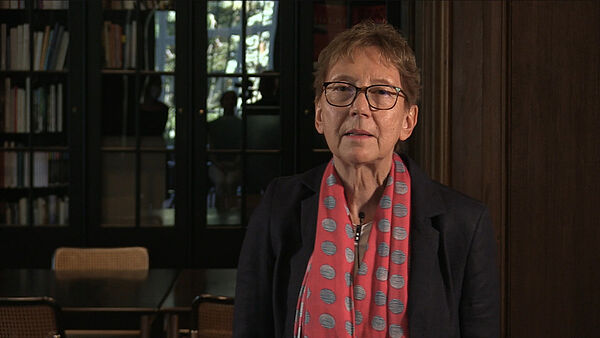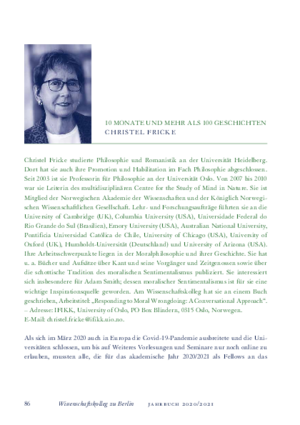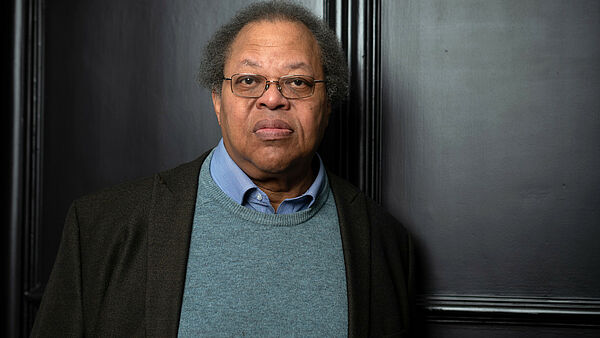
Christel Fricke, Dr. phil.
Professor of Philosophy
Universität Oslo
Born in 1955 in Berlin
Studied Philosophy and Romance Languages at the University of Heidelberg
Arbeitsvorhaben
Reflective Moral Sentimentalism - A Phenomenological Approach
Early versions of moral sentimentalism have been proposed by several key philosophers of the Scottish Enlightenment, including in particular Adam Smith. This approach to the philosophical challenges of moral judgment, volition, and action has regained increasing attention. Moral sentimentalism defends a naturalistic understanding of human morality, informed by recent findings from such social and natural sciences as behavioral and moral psychology and neurobiology. But it is also committed to a normative task; rather than merely describing our normative and moral practices, it makes normative claims as to how we should proceed in order to justify our moral judgments.Reflective Moral Sentimentalism is supposed to preserve claims from both reasons-based moral realism and moral expressivism and nevertheless to avoid their shortcomings. From moral realism, it inherits the commitment to moral truth; and from expressivism, the naturalistic assumption that our sentiments are constitutive of our evaluations in general and of our moral evaluations in particular. The basic claim of Reflective Moral Sentimentalism is that moral judgments are both cognitive and emotional, namely that they are informed by factual beliefs and sentimental responses to the objects of these beliefs.
Reflective Moral Sentimentalism defends the idea that moral judgments are universally valid. Its main challenge is to explain how a judgment can make jus-tified claims to universal authority and nevertheless be based on sentiments. After all, the sentiments different people feel in response to the same action vary to a large extent. How can moral sentimentalism avoid moral relativism and skepticism?
The reflective version of moral sentimentalism that I shall develop proposes an account of the truth of moral judgments in terms of the procedure of their justification. This procedure is communicative in kind. My account of the communicative process of moral justification is inspired by Adam Smith's "Theory of Moral Sentiments" and by the phenomenology of Edmund Husserl.
Recommended Reading
Fricke, Christel, and Mara A. Carrasco. "Impartiality through 'Moral Optics': Why Adam Smith Revised David Hume's Moral Sentimentalism." The Scottish Journal of Philosophy 19, 1 (forthcoming, preprint available on demand).
Fricke, Christel. "Overcoming Disagreement - Adam Smith and Edmund Hus-serl on Strategies of Justifying Descriptive and Evaluative Judgments." In Intersubjectivity and Objectivity in Adam Smith and Edmund Husserl: A Collection of Essays, co-edited with Dagfinn Føllesdal, 171-241. Frankfurt: Ontos Verlag, 2012.
-. "What We Cannot Do To Each Other - On Forgiveness and Moral Vulnerability." In The Ethics of Forgiveness, edited by Christel Fricke, 51-68. London, New York: Routledge, 2011.
Kolloquium, 10.11.2020
Die Konstruktion moralischer Rechte und Pflichten - aus der Perspektive von Opfern
Wir gehen normalerweise davon aus, dass wir moralische Rechte und Pflichten haben, insbesondere das Recht darauf, keinen Schaden zu erleiden, und die entsprechende Pflicht, niemandem einen Schaden zuzufügen und in Krisensituationen zu helfen. Zwei Fragen sind vorranging zu beantworten: Wie kommt es, dass Menschen moralische Rechte und Pflichten haben? Wozu genau sind sie moralisch verpflichtet und worauf haben sie ein moralisches Recht? Die gängigsten Antworten haben Vor- und Nachteile. Ich selbst gehe bei der Beantwortung dieser Fragen von dem Phänomen unserer Verletzlichkeit aus, d. h. von der Opferperspektive. Als Rechtssubjekte sind alle Menschen in einer besonderen Weise verletzlich: Andere können ihre Rechte verletzen. Mein Ansatz geht von den folgenden Überzeugungen aus: (1) Wir müssen uns auf Standards für die Verletzung moralischer Rechte einigen; (2) dabei spielen Erfahrungen von körperlichen, materiellen und seelischen Verletzungen eine zentrale Rolle; (3) die philosophische Theorie der Moral ist gut beraten, in der Verfolgung ihres Anliegens die Perspektive der Opfer zu berücksichtigen und sich nicht nur auf die Perspektive der Täter zu konzentrieren; (4) wir alle müssen immer wieder lernen, wie wir am besten auf die Erfahrung einer Rechtsverletzung reagieren - emotional, in unserem Wollen und in unserem Handeln.
Publikationen aus der Fellowbibliothek
Fricke, Christel (Edinburgh, 2021)
Impartiality through 'moral optics' : why Adam Smith revised David Hume's moral sentimentalism
Fricke, Christel (New York, 2019)
Husserl's phenomenology of intersubjectivity : historical interpretations and contemporary applications Routledge research in phenomenology
Fricke, Christel (Oxford, 2013)
Adam Smith : the sympathetic process and the origin and function of conscience
Fricke, Christel (Frankfurt, M. [i.e.], 2012)
Intersubjectivity and objectivity in Adam Smith and Edmund Husserl : a collection of essays Philosophical research ; Vol. 8
Fricke, Christel (Berlin, 2012)
Fricke, Christel (New York [u.a.], 2011)
What we cannot do to each other : on forgiveness and moral vulnerability
Fricke, Christel (New York, N.Y. [u.a.], 2011)
The ethics of forgiveness : a collection of essays Routledge studies in ethics and moral theory ; 14
Fricke, Christel (2005)
Genesis und Geltung moralischer Normen : ein Gedankenexperiment von Adam Smith


